|
Gums are responsible for holding and protecting the teeth, bleeding gums can be a sign of gum disease, medically called gingivitis. The condition is often due to plaque formation on the teeth that produces acids and toxins to erode and cause inflammation of the gums. Besides plaque formation, other factors that can contribute to bleeding gums include:
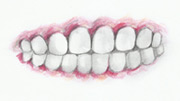 |
Bleeding gums |
 |
Poor oral hygiene habits such as improper blushing, tooth picking or unfitted dentures; |
 |
Hormonal changes such as during pregnancy, menstruation, puberty or menopause; |
 |
Diseases that affect the immune or blood clotting system, such as leukemia, diabetes, mouth sores, liver or kidney dysfunctions; |
 |
Medications such as blood thinner, anticonvulsant, or chemotherapy drugs; |
 |
Nutritional deficiency such as vitamin C or K deficiency; |
 |
Bad habits such as smoking. |
Bleeding gums usually occur along with other oral symptoms such as:
 |
Gums that bleed during and after brushing teeth |
 |
Red, swollen or sore gums |
 |
Bad breath or bad taste in the mouth |
 |
Sensitive teeth |
 |
Receding gums |
 |
Formation of deep pockets between the teeth and gums |
 |
Loose or shifting teeth |
Regardless of the cause, good oral hygiene is fundamental for healthy gums. It is necessary to choose a soft bristle toothbrush, brush the teeth gently, and visit the dentist every 6 to 12 months for plaque removal. In case if the bleeding is severe, or accompanied with other unexplained symptoms, you should consult a doctor.
Traditional Chinese medicine (TCM) can work with modern dentistry to promote gum health.
In TCM theory, the mouth is connected to the rest of the body. Teeth are considered to be remnants of bone and are nourished by kidney essence. The stomach and large intestine meridians pass through the upper and lower tooth beds respectively and supple the blood and qi (vital energy) to the regions. Tooth and gum conditions can reflect the functional states of the kidneys, the stomach or the large intestine. Physicians focus on the internal disharmonies that involve these three organs rather than applying local treatment for tooth and gum problems. In case of bleeding gums, the pathology is either due to excessive fire and heat or inadequate qi; the former forces blood flowing out of the normal pathways and the later makes the gums unable to retain the blood within the vessels. Physicians will look for the gum conditions, accompanying signs, pulse and tongue signs when deciding appropriate remedies. Common disharmony patterns that involve bleeding gums are as below.
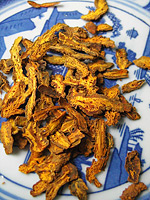 |
|
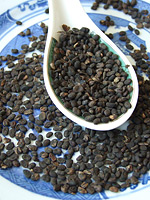 |
|
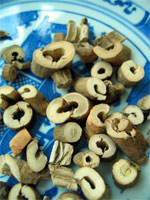 |
| golden thread rhizome |
|
psoralea |
|
peony root bark |
1. Herbal prescriptions for bleeding gums
Heat in stomach and intestines
The bleeding is heavy and bright red in color, other symptoms may include swollen and sore gums, thirst that prefers cold drinks, bad breath, constipation, and yellow urine. A red tongue covered by yellow and thick coating, the pulse is surge and rapid. The remedy should aim to clear stomach and purging fire.
Sample prescription: Clear Stomach Powder plus honeysuckle flower and dandelion
Virtual fire in stomach
A mild gum bleeding, accompanied with swollen, pocket formation or recession of the gums, and mild toothache. There may also be thirst, mouth dryness, a red tongue without coating, and the pulse is thready and rapid. The remedy should aim to clear and purge stomach fire, and nourish stomach.
Sample prescription: Sweet Dew Drink plus cattail pollen
Virtual fire in kidneys
A mild bleeding that can be seen as a red line of blood in the gum line, accompanied with loose and shaky teeth, receding gums, sensitive teeth, dizziness, ear ringing, lumbar soreness and knee weakness. The tongue is red and tender and with little coating, and the pulse is thready and rapid. The remedy should aim to nourish kidneys and subdue minister-fire.
Sample prescription: Rehmannia Pill Plus Anemarrhena and Corktree Bark, plus achyranthes root and psoralea
Spleen deficiency
The gums bleed easily when brushing or sucking, accompanied with paleness of the gums, pale complexion, breath shortness, feeble voice, no appetite and loose bowels. The tongue is pale and bulky, and the pulse is weak and thready. The remedy should aim to invigorate spleen, replenish qi and restore its ability to astringent blood.
Sample prescription: Restore the Spleen Decoction plus hairyvein agrimonia herb and oriental arborvitae leafy-twig
2. Mouth washes for bleeding gums
TCM has a long history of using mouth washes for oral and throat diseases, some early applications can be found in famous TCM classics. Prescriptions Worth a Thousand Gold for Emergencies (wrote by Sun Simiao in 581-682AD) states: mouth washes that made by bamboo shavings and vinegar, or Manchurian wildginger and liquorice root can reduce gum bleeding; salty pine needle solution can relieve swollen and painful gums; while solution that made by rehmannia root, pubescent angelica root and wine can treat loose teeth and sore gums. Compendium of Materia Medica (wrote by Li Shizhen in 1578AD) states: solution that made by Dahurian angelica root and medicinal evodia fruits can relieve acute toothache; and Dahurian angelica root and Sichuan lovage rhizome solution can reduce bad breath. Since mouth rinsing remedies work on the localized lesions, individuals can sometimes attain a faster and more direct result than drinking decoctions. They can also avoid unnecessary drug stimulations to the gastrointestinal tract. In TCM, mouth washes are usually prescribed for conditions like pharyngitis, tonsillitis, periodontitis, toothache and mouth sores.
During practice, physicians will prescribe specifically according to individual conditions. The solution is usually gargled in the mouth for 1 to 2 minutes each time. There is no need to rinse with water afterwards, and remember not to eat immediately. Do this 3 to 5 times a day. Some herbal preparations that are suitable for making mouth washes for bleeding gums are:
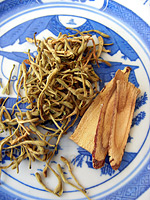 |
Honeysuckle flower and
liquorice root |
 |
Humifuse euphorbia herb (di jin cao, 12g), wolfberry root-bark (15g) and rehmannia root (15g); |
 |
Common scouring rush herb (mu zei, 30g); and yerbadetajo herb (60g); |
 |
Psoralea (30g); |
 |
Gypsum (30g), Amur corktree bark (15g), gallnet of Chinese sumac (15g) and black catechu (6g); |
 |
Honeysuckle flower (15g) and liquorice root (15g); |
 |
Manchurian wildginger (3g), Sichuan pepper (10g) and bugbane rhizome (10g). |
The herbs are boiled with 500ml water for 20 minutes, and then use the solution to rinse the mouth daily.
3. Home care advice for bleeding gums
Prevention is better than cure. Your life habits and diet have an enormous effect on the overall condition of your gums. It is advised to maintain a balanced lifestyle with ample sleep, adequate nutrition and regular exercise. Healthy oral hygiene habits include:
 |
Drink water after eating to wash away the food residue and make it less likely to buildup plaque on the teeth. |
 |
Quit smoking and eliminate snacks between meals, since these are common risk factors for the development of gum disease. |
 |
Reduce stress, a stressful body results in fluctuated hormonal levels and thus increase sensitivity of the gums. |
 |
Eat plenty of fresh vegetables and fruits. |
 |
A simple and bland diet. Over consumption of alcohol and foods that are heavily spicy, greasy and hard not only damage the gums directly, they also bring about heat pathogens which accumulate in the stomach and intestines. The heat pathogens will then irritate the gums through the meridians. |
There is an ancient way for promoting teeth and gums health, in the morning and night before brushing teeth, use your brush or fingers to rub the gums for 2-3 minutes, followed by knocking against the upper jaw and lower jaw for 30-50 times. These will help the blood circulation in the tooth bed and to firm the teeth.
|